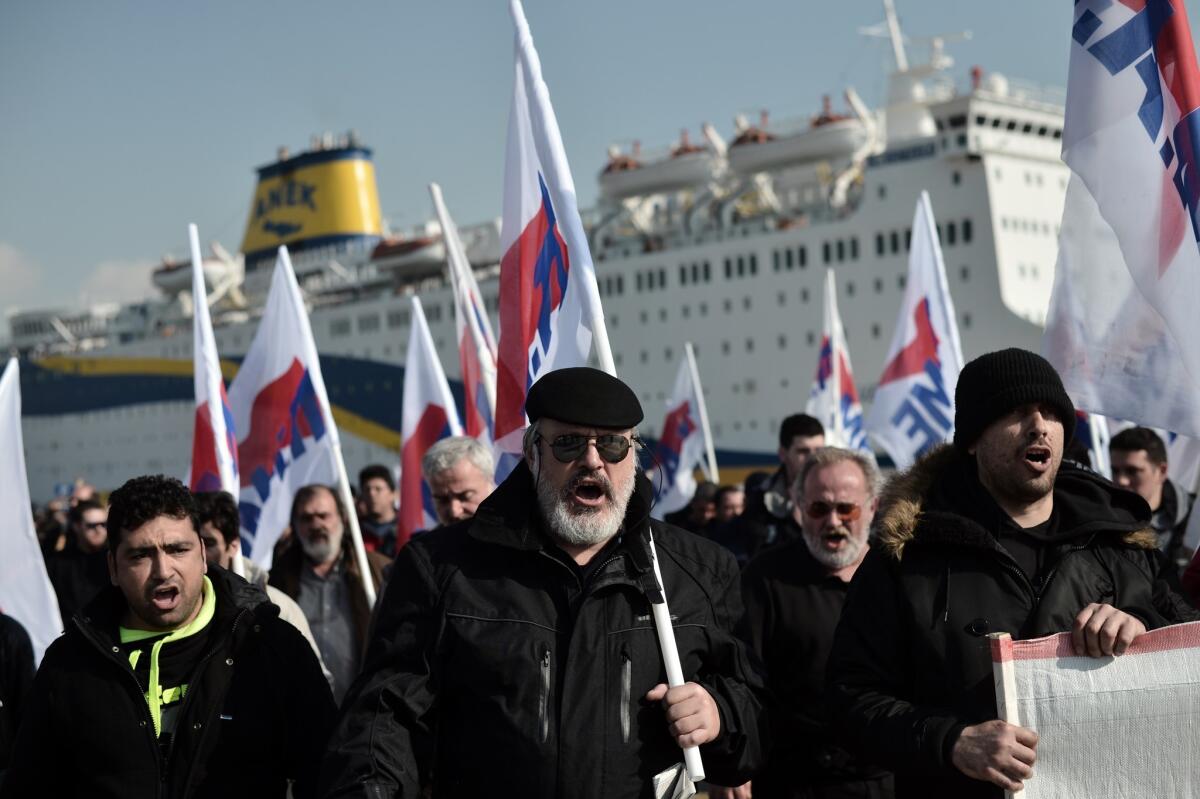Greece orders striking seamen back to work

- Share via
ATHENS — Greece’s embattled ruling coalition Wednesday forced striking seamen to return to work and restore suspended ferry services to dozens of Greek islands that have been cut off from the mainland, leading to food and medical shortages.
The decision to issue an emergency “civil mobilization order” -- the second in two weeks -- signaled the government’s resolve to soldier on with drastic austerity cuts and face down swelling labor unrest sparked by Greece’s worst economic recession since World War II.
On strike for six days, seamen are demanding payment of wages up to six months in arrears and collective contracts instead of the flat, uniform payment rates the government introduced recently as part of sweeping overhauls in labor regulations.
Prime Minister Antonis Samaras sanctioned the civil mobilization order after marathon talks between the government and the seamen’s federation collapsed late Tuesday, which prompted the powerful federation to announce a fresh round of strikes.
With the emergency back-to-work order threatening violators with arrest, imprisonment and potential job loss, thousands of strikers returned to work by 4 a.m. Wednesday, allowing ferries at the country’s biggest port, Pireaus, to set sail for remote islands. Earlier this week, the Cyclades island chain’s chamber of commerce warned the strike was preventing treatment of serious medical cases and even blocking the transport of dead bodies for burial.
“We’re not giving into petty politics when shortages abound and public health is at risk,” said Merchant Marine Minister Costas Mousouroulis.
[Updated 10:15 a.m. Feb. 6: More than 3,000 islands account for about 20% of Greece’s total area, making ferry service a vital link to the mainland for millions of residents and tourists. Scores of islands lack fundamental facilities, such as hospitals and desalination units, requiring almost exclusive assistance from the mainland or bigger, neighboring isles.]
Civil mobilization orders are considered a last-ditch measure and have been issued only 10 times since the collapse of Greece’s military dictatorship in 1974. Four have been issued since the start of Greece’s debt crisis in 2009; one of them came two weeks ago when the government ordered striking subway workers back to work.
On Wednesday, the seamen were meeting to determine their course of action. Other labor unions declared a sympathy strike in the greater Athens area for the day.
The government’s resort to emergency powers sparked fresh political fury and polarized Greek society even further, pitting the administration’s hard-nosed bid to fix the country’s faltering economy against growing numbers of Greeks unable to endure added austerity.
“Democracy is under threat,” said Panayiotis Lafazanis, a member of the radical leftist Syriza party, which wants to tear up the international bailout agreements that have kept Greece afloat with rescue loans but demanded punishing spending cuts in return.
“People are suffering, bleeding, and the government’s claim to austerity isn’t convincing,” Lafazanis said. “The government isn’t playing by the rules of democracy. It’s brandishing a perverse form of democratic dictatorship.”
ALSO:
Iran agrees to nuclear talks with six world powers
Jail time for journalist and Somali woman who alleged rape
British Parliament approves gay marriage despite Conservative foes
More to Read
Sign up for Essential California
The most important California stories and recommendations in your inbox every morning.
You may occasionally receive promotional content from the Los Angeles Times.










